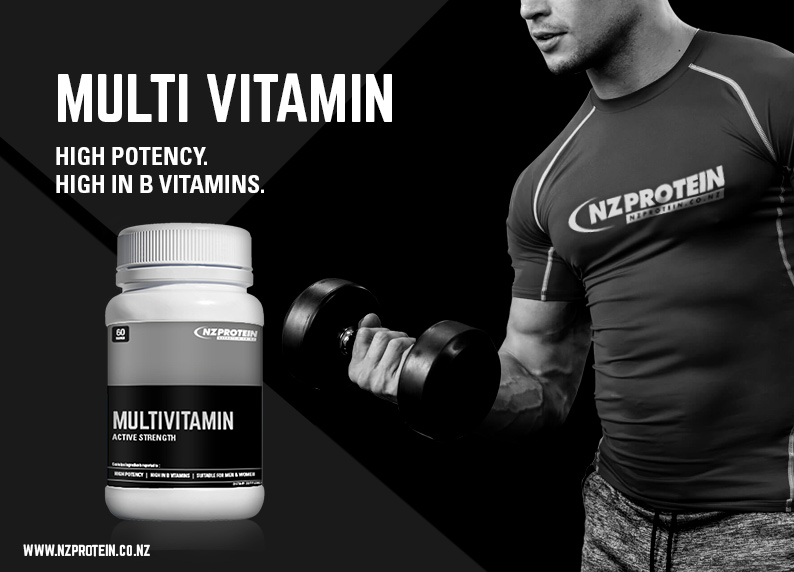
Ideally you should be able to get all the vitamins you need through a varied diet and spending enough time in the sun. Unfortunately not everyone gets sufficient amounts of the good stuff their bodies need. This is where supplementation can come in handy. If you aren’t sure whether you need a daily multivitamin then read below. This article will explain what multivitamins do and who could benefit from taking them.
What Do Vitamins Do?
Vitamins are the hard workers behind the scenes that keep our bodies working how they should. They all play different roles in the body and we need the right amounts of each one. Too much of a certain vitamin can result in negative side effects and too little equals deficiency. How much we need of each one will vary from person to person.

Some vitamins (like K, E and A) are fat-soluble meaning they get stored in our liver and other tissues. Other vitamins (like C and B) are water-soluble. This means they don’t hang around for very long and will leave the body through urine. If we don’t get enough vitamins we will feel fatigued and moody. You might even notice physical signs like hair loss, bleeding gums or brittle nails. Adequate nutrition is important for both our physical and mental health. Neglecting your vitamin intake will prevent you from looking and feeling your best.
Who Needs To Supplement?
You should be able to get all the vitamins you need through diet and being outdoors. However not everyone eats optimally and some populations are at higher risk of deficiency. Expectant mothers in particular often will supplement to ensure they and the baby are getting all of the vitamins they need. Vitamin D and folic acid are especially important for those who are pregnant because it reduces the risk of your baby being born with defects.

Other populations like those on a restricted diet or those with health issues can benefit from vitamin supplements. If you don’t eat a wide range of foods then a multivitamin can be super helpful. Some people even have conditions that make it hard for their bodies to absorb nutrients from food. Obviously anyone with specific health conditions should follow the advice given by their doctor.
Older folk are another population who should consider supplementing. Especially if they struggle with chewing and swallowing food. We don’t think it is wise to rely on supplements but they can be extremely useful in certain situations. Even if you are generally healthy, a daily multivitamin can bring you peace of mind. They can make up for any gaps in your diet and ensure you’re getting sufficient amounts of everything you need.
What’s In It?
If you’re looking for a decent multivitamin, NZProtein has a good one here. We aren’t just saying that because we want you to buy it. Our pills are easy to swallow and contain sufficient amounts of each vitamin. Too many products on the market claim to be decent multivitamins but contain insufficient quantities to make any noticeable difference to your health or are ridiculously overdosed. One NZProtein multivitamin per day is all you need to avoid deficiency in most essential vitamins and minerals. You won’t have to take multiple pills to get the recommended serving and our vege capsules are easy to swallow. Here is a run down of what we put in our NZProtein multivitamin and what each ingredient is good for.

|
Name |
Quantity Per Serving |
What For? |
|
Vitamin A |
3000IU |
|
|
Vitamin C |
250mg |
Helps with biological processes. Can lower uric acid (reducing risk of gout). May benefit brain health, cortisol levels and pancreatic health. |
|
Vitamin D3 |
1000IU |
|
|
Vitamin E |
>29IU |
Can boost immunity (especially in the elderly) and supports oxidisation. |
|
Vitamin H (Biotin) |
100mcg |
|
|
Vitamin B1 |
40mg |
|
|
Vitamin B2 |
30mg |
|
|
Vitamin B3 |
40mg |
|
|
Vitamin B5 |
30mg |
Assists enzymatic function and is good for energy production. |
|
Vitamin B6 |
30mg |
|
|
Folic Acid |
300mcg |
|
|
Vitamin B12 |
20mcg |
Deficiency can lead to fatigue and low mood. Vegans especially can benefit from supplementation. |
|
Boron |
10mg |
Has antiinflammatory effects and may improve testosterone levels. |
|
Calcium |
96mg |
|
|
Chromium |
30mcg |
Regulates glucose metabolism and insulin sensitivity. Beneficial for diabetics. |
|
Copper |
1.5mg |
|
|
Iodine |
100mcg |
|
|
Iron |
3mg |
|
|
Magnesium |
90mg |
|
|
Manganese |
2.5mg |
|
|
Potassium |
90mg |
Prevents cardiovascular diseases. Deficiency is quite common. |
|
Selenium |
150mcg |
|
|
Silica (bamboo extract) |
14mg |
|
|
Zinc |
10mg |
Any Side Effects?
Too much or too little of anything will result in negative side effects. Overconsumption of water-soluble vitamins is not usually a major issue due to the fact that we can urinate them out. Taking megadoses of fat-soluble vitamins can wreak more havoc, especially when done for long periods of time. However, taking one multivitamin a day should not put you at risk of any negative side effects. Mainlining supplements or eating tubs of vitamin gummies is never going to end well. But if you stick to the recommended serving sizes and don’t get silly, you shouldn’t notice any negatives. As the saying goes, “the dose makes the poison.”

Conclusion
Taking supplements will not make up for a poor diet. In saying this, none of us eat perfectly. Life gets busy and some days we won’t consume enough of the vitamins we need. Taking a multivitamin daily can keep your energy levels consistent and significantly reduce your risk of deficiency. Those with little variation in their diets, expectant mothers and the elderly are examples of people who should seriously consider taking one. Multivitamins are relatively inexpensive and could be the difference between feeling fatigued and being on your game.

